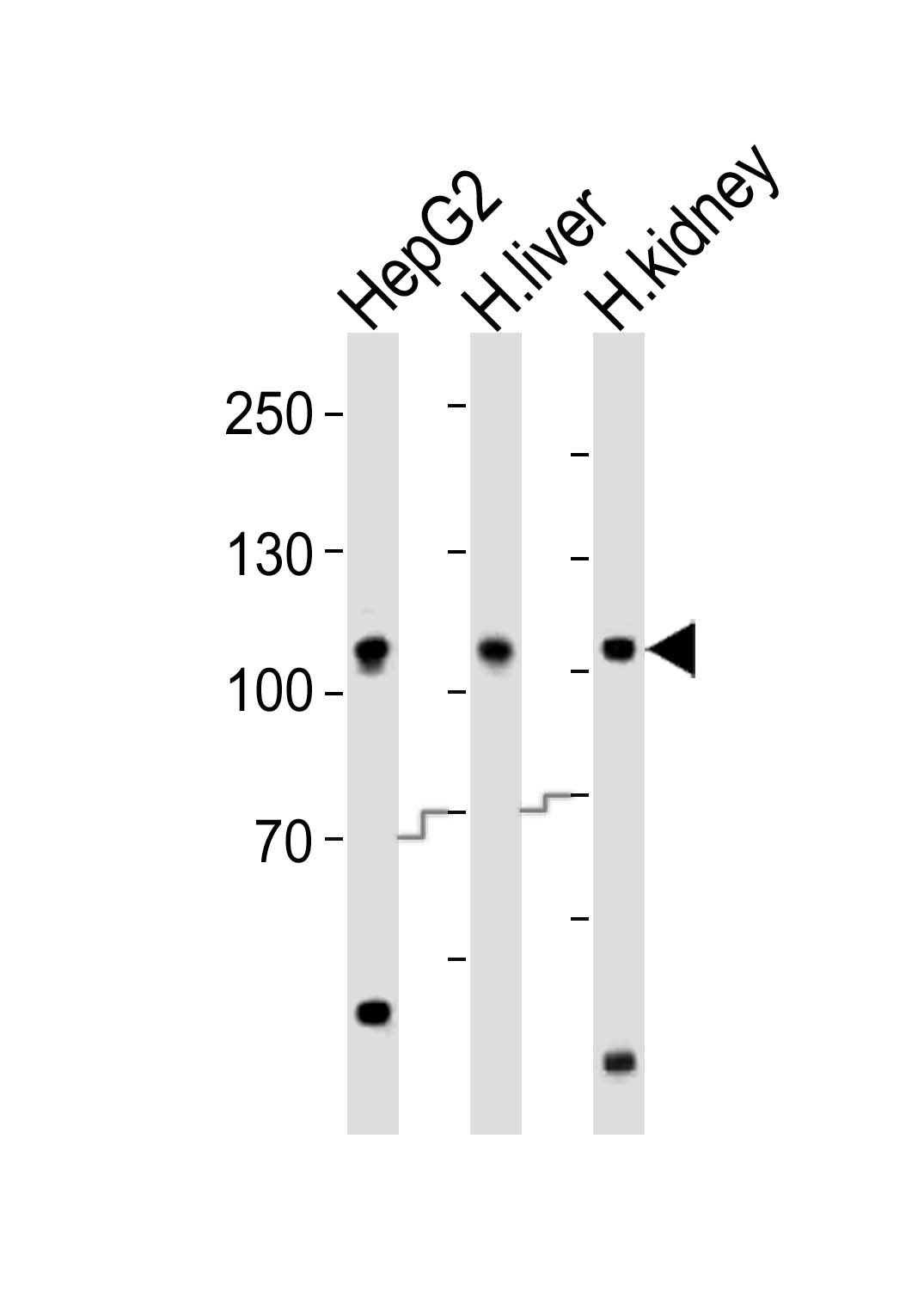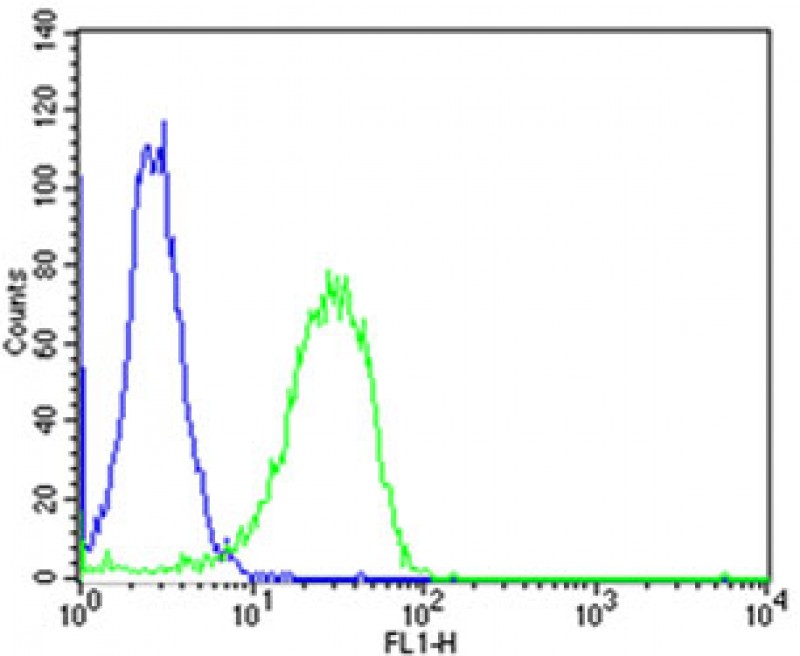MTTP Antibody (C-term)
Purified Rabbit Polyclonal Antibody (Pab)
- SPECIFICATION
- CITATIONS
- PROTOCOLS
- BACKGROUND

Application
| FC, WB, E |
|---|---|
| Primary Accession | P55157 |
| Reactivity | Human |
| Host | Rabbit |
| Clonality | Polyclonal |
| Isotype | Rabbit IgG |
| Calculated MW | 99351 Da |
| Gene ID | 4547 |
|---|---|
| Other Names | Microsomal triglyceride transfer protein large subunit, MTTP, MTP |
| Target/Specificity | This MTTP antibody is generated from a rabbit immunized with a KLH conjugated synthetic peptide between 878-911 amino acids from the C-terminal region of human MTTP. |
| Dilution | FC~~1:25 WB~~1:1000 E~~Use at an assay dependent concentration. |
| Format | Purified polyclonal antibody supplied in PBS with 0.09% (W/V) sodium azide. This antibody is purified through a protein A column, followed by peptide affinity purification. |
| Storage | Maintain refrigerated at 2-8°C for up to 2 weeks. For long term storage store at -20°C in small aliquots to prevent freeze-thaw cycles. |
| Precautions | MTTP Antibody (C-term) is for research use only and not for use in diagnostic or therapeutic procedures. |
| Name | MTTP |
|---|---|
| Synonyms | MTP |
| Function | Catalyzes the transport of triglyceride, cholesteryl ester, and phospholipid between phospholipid surfaces (PubMed:15897609, PubMed:16478722, PubMed:22236406, PubMed:23475612, PubMed:25108285, PubMed:26224785, PubMed:8876250, PubMed:8939939). Required for the assembly and secretion of plasma lipoproteins that contain apolipoprotein B (PubMed:16478722, PubMed:23475612, PubMed:26224785, PubMed:8876250, PubMed:8939939). May be involved in regulating cholesteryl ester biosynthesis in cells that produce lipoproteins (By similarity). |
| Cellular Location | Endoplasmic reticulum. Golgi apparatus. Note=Colocalizes with P4HB/PDI in the endoplasmic reticulum (PubMed:23475612, PubMed:26224785) |
| Tissue Location | Liver and small intestine. Also found in ovary, testis and kidney. |

Thousands of laboratories across the world have published research that depended on the performance of antibodies from Abcepta to advance their research. Check out links to articles that cite our products in major peer-reviewed journals, organized by research category.
info@abcepta.com, and receive a free "I Love Antibodies" mug.
Provided below are standard protocols that you may find useful for product applications.
Background
Catalyzes the transport of triglyceride, cholesteryl ester, and phospholipid between phospholipid surfaces. Required for the secretion of plasma lipoproteins that contain apolipoprotein B.
References
Shoulders C.C.,et al.Hum. Mol. Genet. 2:2109-2116(1993).
Sharp D.,et al.Nature 365:65-69(1993).
Sharp D.,et al.Biochemistry 33:9057-9061(1994).
Ota T.,et al.Nat. Genet. 36:40-45(2004).
Hagan D.L.,et al.J. Biol. Chem. 269:28737-28744(1994).
If you have used an Abcepta product and would like to share how it has performed, please click on the "Submit Review" button and provide the requested information. Our staff will examine and post your review and contact you if needed.
If you have any additional inquiries please email technical services at tech@abcepta.com.













 Foundational characteristics of cancer include proliferation, angiogenesis, migration, evasion of apoptosis, and cellular immortality. Find key markers for these cellular processes and antibodies to detect them.
Foundational characteristics of cancer include proliferation, angiogenesis, migration, evasion of apoptosis, and cellular immortality. Find key markers for these cellular processes and antibodies to detect them. The SUMOplot™ Analysis Program predicts and scores sumoylation sites in your protein. SUMOylation is a post-translational modification involved in various cellular processes, such as nuclear-cytosolic transport, transcriptional regulation, apoptosis, protein stability, response to stress, and progression through the cell cycle.
The SUMOplot™ Analysis Program predicts and scores sumoylation sites in your protein. SUMOylation is a post-translational modification involved in various cellular processes, such as nuclear-cytosolic transport, transcriptional regulation, apoptosis, protein stability, response to stress, and progression through the cell cycle. The Autophagy Receptor Motif Plotter predicts and scores autophagy receptor binding sites in your protein. Identifying proteins connected to this pathway is critical to understanding the role of autophagy in physiological as well as pathological processes such as development, differentiation, neurodegenerative diseases, stress, infection, and cancer.
The Autophagy Receptor Motif Plotter predicts and scores autophagy receptor binding sites in your protein. Identifying proteins connected to this pathway is critical to understanding the role of autophagy in physiological as well as pathological processes such as development, differentiation, neurodegenerative diseases, stress, infection, and cancer.



